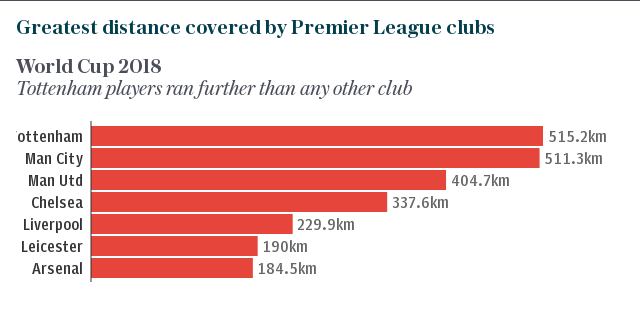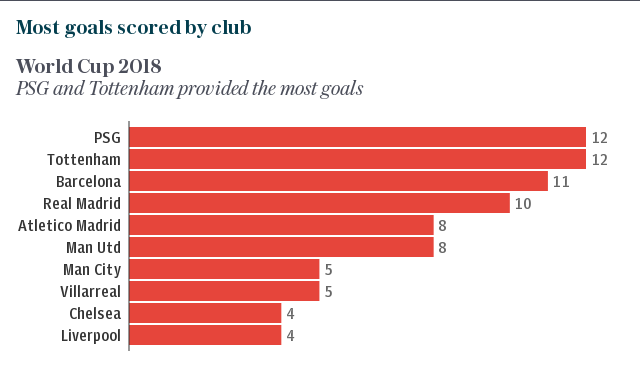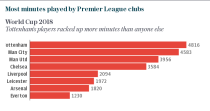How the World Cup will affect the new Premier League season
That's it then. Football's over. The World Cup has finished and life is empty again. For three-and-a-half weeks.
If you can't survive on Europa League qualifiers and ludicrously uncompetitive pre-season friendlies (hello, Everton 22 ATV Irdning 0), then you have less than a month to wait for the return of the greatest league on the planet™.
And so, as club rivalries resume, fellow England fans becomes arch enemies once again, Jesse Lingard and John Stones head to opposite sides of Manchester and Cesc Fabregas goes back to playing, the Premier League returns on August 10.
But how much impact will the last five weeks of international football have on the domestic game?
READ MORE: Why Stones will re-watch every England game
READ MORE: Pogba angered England fans with his celebrations
Fatigue
With nine players having taken part in the semi-finals, final and third-place play-off, Tottenham could be hit hard by such heavy involvement in the latter stages of the World Cup.
Harry Kane has stated a desire to make himself available to play in Spurs' first Premier League game, at Newcastle, but realistically that match, in just 26 days' time, will come too soon for him.
Tottenham's players racked up a total of 4816 minutes at the World Cup, which is more than any other club in the world. 11 of their players played in the knockout stages.

Compare this to rivals Arsenal and there is a real chance that Unai Emery could lead his new club to a fast start to the season - something that they are not used to at the Emirates.
Under Arsene Wenger, Arsenal were often eased back into the season, allowed to return extra late after international tournaments in the summer, and tended to slip up.
This year, though, with the likes of Pierre-Emerick Aubameyang's Gabon not having qualified, Alexandre Lacazette missing out on a France call-up and Mesut Ozil's early elimination, Arsenal could be fresh for the season. Arsenal players were on the pitch for 1820 minutes at the World Cup - around 50 hours less than Tottenham's.

Meanwhile, Manchester City had plenty of players go deep in the competition, while United could be without as many as 12 players for their season opener against Leicester, having seen seven players make the semi-finals, including Paul Pogba, who on Sunday became the first Manchester United player ever to score in a World Cup final.
City were the club with the second-most minutes played in Russia, followed by United and Chelsea. Liverpool could also be relatively fresh, with their players having played only slightly more World Cup football than Arsenal.
Distance covered
Tottenham's players also covered more ground than any other club at the World Cup, with Man City's only just behind them.
United and Chelsea follow next, but again, Liverpool and Arsenal's players should be much fresher having had a relatively quiet World Cup.

Confidence
There may, however, be some psychological positive to progress into the latter stages of the World Cup.
Tottenham were the joint-highest scoring club in Russia (along with Paris Saint-Germain), with 12 goals, which was 50 per cent more than any other Premier League team.
Manchester United provided the second-most goals, with eight, while City scored five and Liverpool four.

Chelsea, though, may benefit more than any other Premier League side from France's triumph, having scored four goals but with two players having started and won the final in N'golo Kante and Olivier Giroud.
Set-pieces
There will be no VAR in next season's Premier League (whether that is a good thing is a debate for another day) and while that will probably mean penalties aren't awarded in quite the same quantity as they were in Russia (a World Cup record 29 were taken, which is 11 more than at any other tournament), there may well be harsher refereeing when it comes to grappling in the box.
It's been a couple of years since Premier League referees were told to clamp down on holding at corners, but the World Cup saw a number of penalties awarded when defenders had a grip on attackers at set-pieces, and that could set a trend.
It meant we saw 43.2 per cent of goals scored from set-piece situations at Russia 2018, which is a higher proportion than at any other World Cup and far more than the 27 per cent scored from set-pieces during the 2017/18 Premier League season.

Given the success of England's 'love train' in Russia, clubs back home may well follow suit and look to take advantage at set-pieces more often.
It's unlikely that a 64-game summer tournament will inspire a massive change to domestic football, or that a Premier League team will base their entire game around dead balls - like Sam Allardyce's Bolton or, well, Gareth Southgate's England - but we could see more innovation than in previous years. It may even level the playing field ever so slightly.

 Yahoo Sport
Yahoo Sport 















































